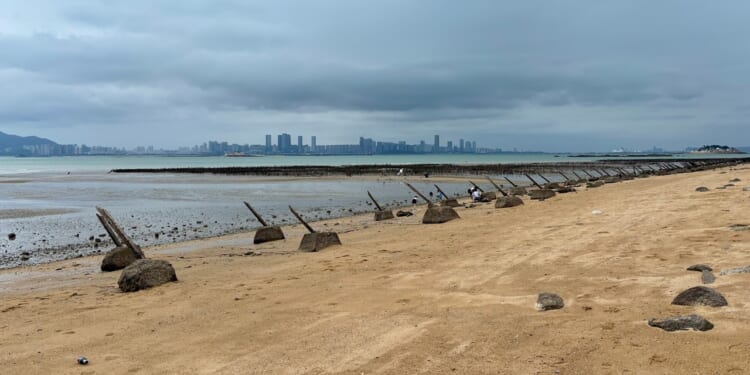The United States’ loss in its trade war with China should be a dire warning to Taiwan that the Americans are rethinking their commitments.
A strange thing has happened. President Donald Trump appears to have stood down in the trade war he initiated with the People’s Republic of China (PRC). Why? Unfortunately, it appears to have been because the Americans were losing.
Recently, US Treasury Secretary Scott Bessent made the comment that China is either entering a massive recession or a major depression—and Xi Jinping is trying to take the whole world economy down with them. That very well may be true. Irrespective of this, the fact remains that China has the Americans right where they want them on trade.
Donald Trump’s Trade War Was Folly
By playing their ace in the hole—China’s overwhelming dominance in the global rare earth mineral market, Beijing has effectively cut the Americans off at the knees when it comes to escalating the trade war. Already, China has extracted serious concessions from Washington in the form of Trump’s recent authorization allowing for NVIDIA to sell advanced computer chips to Chinese tech firms—though Trump continues to deny China access to NVIDIA’s most cutting-edge chips.
It gets better for Beijing, though. Recently, the Trump administration opted to deny Taiwan a previously negotiated $400 million weapons deal. These weapons would be crucial for any defense of the embattled island. It is no secret that the Trump White House nixed this deal as part of its larger attempt to end the trade war with the Chinese. Yet the Chinese are not budging on their intransigent position on rare earths.
There remains a real chance that Trump will get some semblance of a deal with China. But America’s inauspicious showing in the trade war—which apparently came as a shock to the White House—is a wakeup call for what the future portends in terms of US-China relations. And it certainly doesn’t bode well for Taiwan, which now finds itself as little more than a sacrificial lamb in the trade war between Beijing and Washington.
The United States Might Not Be Willing to Defend Taiwan
Leaders in Taipei are now forced to question both Trump’s and America’s overall commitment to their defense. By all indications—as shown by the nixing of the defense deal—the United States under the Trump administration is not committed to the defense of the besieged island.
In other words, Taipei is on its own. Beijing knows it, which is why it is becoming increasingly belligerent—and confident—in their treatment of the Taiwan issue. The failing US trade war with China, and Trump’s willingness to abandon Taiwan in the process of waging that losing trade war, is indicative of what will happen if China moves militarily against Taiwan.
Just like their vise-like grip on the world’s known quantities of rare earth mineral mines and processing plants, China has spent at least a decade enhancing its ability to project power in the First Island Chain—specifically against Taiwan. At the same time, Beijing has reliably built a capability to deny the Americans access to the First Island Chain whenever it decides to launch the attack.
The fact of the matter is that there is simply no way, under present conditions, for the Americans to catch up with the advances that China has made in achieving dominance in their near abroad. Of course, over time, the Americans can likely build countermeasures. But that’s all in the long term. In the near- and-medium-term, China retains serious advantages.
America Won’t Save Taiwan. Taiwan Needs to Save Itself.
Just as they have demonstrated with the trade war, if China decides to attack Taiwan, there will be little that the United States can—or will—do to help Taiwan. Taipei needs to work out a new strategy for dealing with Beijing—one that relies as little on the Americans as possible, because the Americans will not be there when Taiwan needs them.
The trade war is a warning to the world that the Americans are rethinking their commitments. This is not necessarily because America wants to abandon those commitments. Instead, it simply recognizes that it has been outmaneuvered by its rivals in key areas, such as in the rare earth mineral industry and in dominating the First Island Chain. This is the inevitable consequence of nearly 30 years of American laxness following the end of the Cold War.
If China attacks Taiwan soon, Taiwan will be left to stand alone.
About the Author: Brandon J. Weichert
Brandon J. Weichert is a senior national security editor at The National Interest. Recently, Weichert became the host of The National Security Hour on America Outloud News and iHeartRadio, where he discusses national security policy every Wednesday at 8pm Eastern. He is also a contributor at Popular Mechanics and has consulted regularly with various government institutions and private organizations on geopolitical issues. Weichert’s writings have appeared in multiple publications, including The Washington Times, National Review, The American Spectator, MSN, The Asia Times, and others. His books include Winning Space: How America Remains a Superpower, Biohacked: China’s Race to Control Life, and The Shadow War: Iran’s Quest for Supremacy. His newest book, A Disaster of Our Own Making: How the West Lost Ukraine is available for purchase wherever books are sold. He can be followed via Twitter @WeTheBrandon.
Image: Shutterstock / CynUniverse.


















